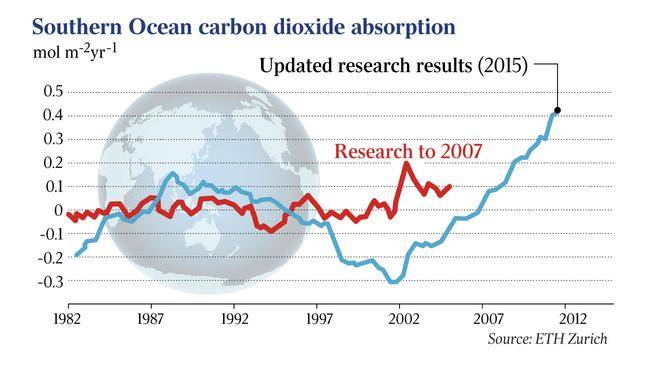Fort Fun Indiana
Diamond Member
- Mar 10, 2017
- 119,876
- 123,046
- 3,645
- Thread starter
- #21
Yes, scientists thought of that. The fact is that the amount of water comtained in all the arctic ice is such a tiny amount compared to that already in the oceans, that the effect you suggest is negligible.
Actually, I don't know if you understood the proposition. It has NOTHING to do with the water content of the ice that disappeared. It's the fact that the PRESENCE of the ice was blocking the ability of atmospheric CO2 to permeate and mix into the COLD water below. Once that ice cover disappears -- it's the most efficient CO2 sinking source that we have on the planet. Once in the water, MUCH gets sequestered down in Davy Jones locker and is trapped for a very long tim
Yes, scientists thought of that. The fact is that the amount of water comtained in all the arctic ice is such a tiny amount compared to that already in the oceans, that the effect you suggest is negligible.
Actually, I don't know if you understood the proposition. It has NOTHING to do with the water content of the ice that disappeared. It's the fact that the PRESENCE of the ice was blocking the ability of atmospheric CO2 to permeate and mix into the COLD water below. Once that ice cover disappears -- it's the most efficient CO2 sinking source that we have on the planet. Once in the water, MUCH gets sequestered down in Davy Jones locker and is trapped for a very long time.
That seems nonsensical, given that the gasses in our atmosphere are constantly circulating. I did a search for any published science which shows that increased surface area of the ocean due to melting sea ice would lead to significantly increased carbon sink, and I found exactly none. Could you please point me to the research which led you to this conclusion?
It also seems absurd that lifelong scientists would not be taking this into account. Could you also provide some sort of reasoning that would help a person to believe that a layman could come up with this before lifelong scientists did?
That seems nonsensical, given that the gasses in our atmosphere are constantly circulating. I did a search for any science which shows that increased surface area of the ocean due to loss of sea ice would lead to significantly increased carbon sink, and I found exactly none. Could you please point me to the research which led you to this conclusion?
It also seems absurd that lifelong scientists would not be taking this into account. Could you also provide some sort of reasoning that would help a person to believe that a layman could come up with this before lifelong scientists did?
Of course the appropriate scientists know this. That's why it's a STILL a debate and not settled science.
I'll be glad to help. And back up my assertions. Start here.
Revived oceanic CO2 uptake | ETH Zurich
Revived oceanic CO2 uptake
10.09.2015 | News
By: Peter Rüegg | 1 Comment
A decade ago scientists feared that the ability of the Southern Ocean to absorb additional atmospheric CO2 would soon be stalled. But the analysis of more recent observations show that this carbon sink reinvigorated during the past decade.
Breathe in, breathe out, in, out… Like a giant lung, the Southern Ocean seasonally absorbs vast amounts of carbon dioxide (CO2) from the atmosphere and releases it back later in the year. But on an annual average the seas surrounding Antarctica absorb significantly more CO2 than they release. Most importantly, these seas remove a large part of the CO2 that human activities emit into the atmosphere, thereby slowing down the growth of this greenhouse gas in the atmosphere, lessening the rate of climate change. Although the Southern Ocean represents no more than a quarter of the total surface of the world’s oceans, it accounts for 40 percent of the global oceanic uptake of that man-made CO2.
From the year 2005, however, scientists pointed out that the Southern Ocean carbon sink might have begun to "saturate”. Based on model results, they suggested that it had not increased since the late 1980s. This was unexpected as one had assumed that a direct relationship existed between the magnitude of the carbon sink and the concentration of atmospheric CO2: the higher the concentration of CO2 in the air, the greater the amount of CO2 absorbed by the sea.
Now the tables have turned. Since the beginning of the millennium the Southern Ocean carbon sink has become much stronger, thereby regaining its expected strength. This is demonstrated by an international research team led by Nicolas Gruber, a professor of environmental physics at ETH Zurich, and his postdoc Peter Landschützer in a study recently published in Science.

Now ---- for your homework, take those "revised" numbers for CO2 absorption (like 3.5 or 4.0 mol/m2/yr and look up what a brand new VIRGIN forest sinks in terms of CO2 per year per meter squared...
When the Arctic Ice dissipates, there's a giant sucking sound for new CO2 absorption ability...
That's nice. I have no desire to try to convince a blog-educated denier that he is wrong, nor will I breathe any life into the idea that he is undermining accepted theories without doing any actual research or by substituting his own superstitions for an actual education. Your freakish denial and tendency to believe you have "scooped" the world's scientists by misrepresenting their own work is absurd and embarrassing to watch, and you guys will die off eventually.
Back to the topic: while scientists are not predicting that Earth will become Venus, they are worried what runaway warming will do to the well-being of humans and to their economies. This, of course, is a tough sell, given the selfishness of humans.